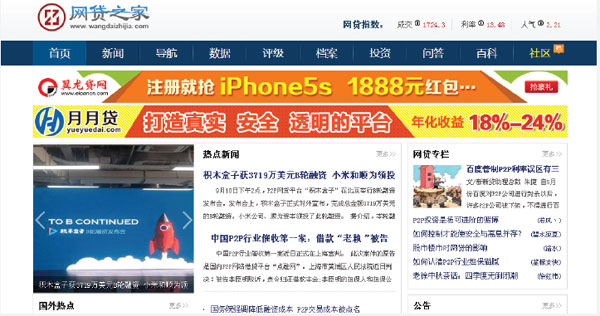Curbs on Internet finance needed, says ex-CBRC chief
Updated: 2014-09-24 05:51
By Xie Yu in Hong Kong(China Daily)
|
|||||||||

The advent of Internet finance that has been sweeping the mainland and threatening to disrupt the banking industry, has not posed risks to the financial system, but more regulations are needed, the mainland's former chief banking regulator said in Hong Kong.
Internet finance companies should mainly focus on small loans, which, compared to big credits, have a lower ratio of non-performing loans, Liu Mingkang, former chairman of the China Banking Regulatory Commission (CBRC), told the inaugural Hong Kong Internet Finance Summit.
And these firms should stay away from certain traditional banking sectors, like bond trading, to reduce default risks, Liu said.
"The authorities should issue guidelines and rules to regulate this sector as soon as possible," he said.
As China becomes a more mobile society, Internet finance has been developing rapidly in the past two years. Internet finance products, including money market funds, insurance products, third-party payment platforms and peer-to-peer (P2P) lending, are attracting clients by offering more flexible settlement terms and higher returns.
Compared to other financial products, P2P and crowd-funding are considered more risky and have caused rising default cases.
The People's Bank of China - the nation's central bank - said in its latest China Financial Stability Report in April that Internet finance is experiencing its "developing and observation period". However, no detailed instructions or regulations have yet been issued.
"We expect regulators to issue overall supportive measures to promote innovation, with some clearer guidance, in the coming quarters," said Victor Wang, head of China banking research at Credit Suisse.
Based on data provided by P2P online lending portal wangdaizhijia.com, crowd-funding is at its initial stage and its volume should be under one billion yuan, while the P2P lending volume is between 20 and 30 billion yuan, but the balance should be meaningfully lower. The existing on-book bank loan size is slightly more than 70 trillion yuan.
"In other words, we're talking about single-digit billion yuan online lending, versus 70 trillion yuan from traditional bank loans. I do not think the former will take more than 1 percent of market share within two or three years," Wang said.
However, he said the development of online lending will still be faster than that in the US or Europe. As online lending is targeting retailers and small-and-medium enterprises (SMEs) that have been "for so long ignored or underserved" by traditional banks, the demand is there.
"Internet finance is very inspiring, but I do not think the mass data-support credit rating could control risks," said Luo Rui, chief executive officer of Hong Kong-listed China Financial Services Holdings Ltd (CFSH), which specializes in lending to SMEs, based on mortgage.
"The biggest problem with SMEs is that they need fast loans and they are exposed to higher risks compared with State-owned companies. That partly explains why SMEs find it difficult to obtain bank loans," Luo said, adding that the Internet will enable them to build up a platform to do match making for lenders and borrowers, and help them expand their businesses and upgrade services.
Although still in its infancy, Internet finance has drawn much attention and discussion on the mainland. Many analysts believe it is absolutely disruptive to the traditional banking industry, and the latter has been fighting back by raising savings rates and issuing brand new wealth management products.
"Electricity power is applied in every industry, but it cannot monopolize all business activities. Internet is just like that," said Yang Liqing, an analyst with Bank of Communications International, noting that traditional banks should reposition themselves and make good use of their professional strength.
xieyu@chinadaily.com.cn
(China Daily 09/24/2014 page9)